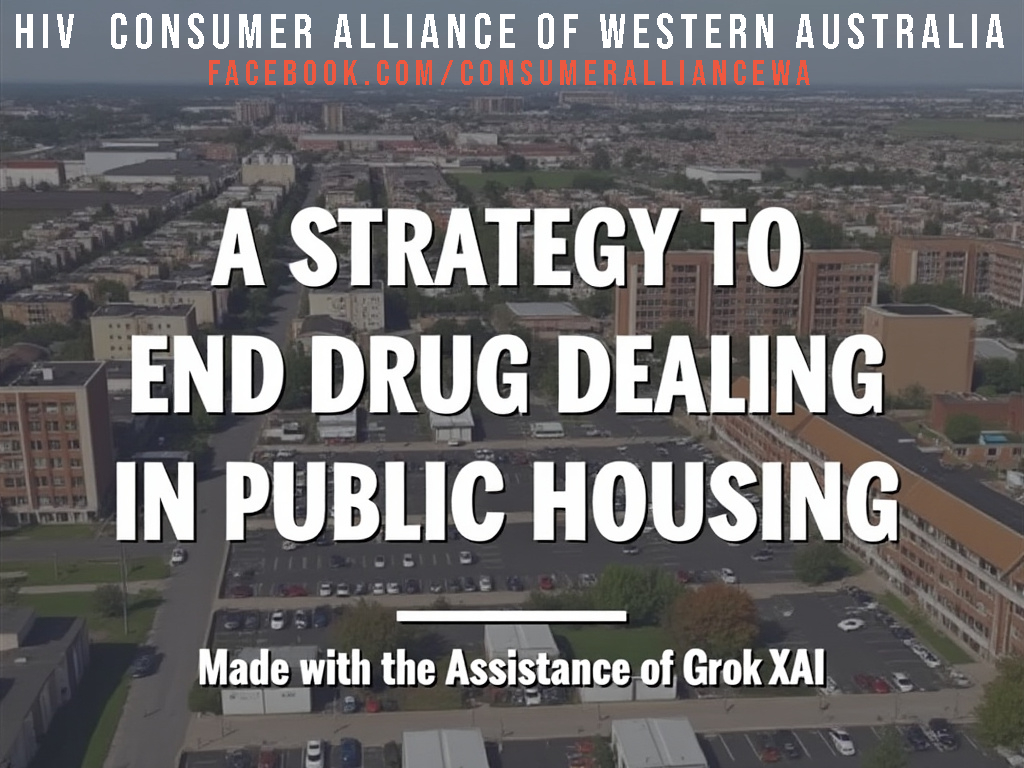A Strategy to End Drug Dealing in Public Housing.
To effectively prevent drug dealing in social housing, a multi-faceted approach involving community, legal, and social interventions is necessary. Here's how it could be addressed:
**1. Community Engagement:**
- **Tenant Engagement:** Encourage residents to form neighborhood watch groups or tenant associations that monitor and report suspicious activities. This community policing approach leverages local knowledge and increases vigilance.
- **Education Programs:** Implement education programs that inform residents about the signs of drug dealing, how to report it safely, and the community benefits of a drug-free environment.
**2. Policy and Legal Framework:**
- **Strong Lease Agreements:** Include explicit clauses in lease agreements prohibiting drug-related activities. This gives legal ground for eviction if such activities are proven.
- **Eviction for Breach:** Swift legal action should be taken against individuals involved in drug dealing according to the lease terms. This requires efficient legal processes to enforce evictions where drug activities are confirmed.
- **Zero Tolerance Policies:** Adopt policies similar to the "one strike and you're out" approach, which might involve immediate eviction for drug-related crimes, but balanced with due process to prevent abuse of power.
**3. Physical Security Measures:**
- **Surveillance and Lighting:** Improve lighting and consider installing CCTV cameras in common areas to deter criminal activities and increase the likelihood of detection.
- **Access Control:** Implement secure entry systems for buildings to limit who can enter, making it harder for non-residents to conduct drug deals within the premises.
**4. Collaboration with Law Enforcement:**
- **Police Partnerships:** Work closely with local law enforcement to monitor known drug hotspots and respond quickly to reports of drug dealing. Regular police patrols can act as a deterrent.
- **Information Sharing:** Establish protocols for sharing information between housing management, residents, and police to enable timely interventions.
**5. Support Services:**
- **Recovery and Support Programs:** Provide or facilitate access to drug rehabilitation and support services for residents. This can help those struggling with addiction and potentially reduce the supply and demand for drugs within the housing.
- **Employment and Education:** Offer pathways to employment or education which can reduce economic incentives for drug dealing by providing legitimate income sources.
**6. Housing Management:**
- **Tenant Screening:** While being careful not to violate fair housing laws, conduct thorough background checks to screen out individuals with recent histories of drug-related crimes or dealing.
- **Property Maintenance:** Keep the property in good condition. A well-maintained environment can foster a sense of community pride and deter criminal activities.
**7. Addressing Vulnerability:**
- **Protecting Vulnerable Tenants:** Implement measures to protect vulnerable tenants from being exploited through practices like "cuckooing," where drug dealers take over a home to use as a base.
**8. Legal Tools:**
- **Injunctions and ASB Orders:** Use legal tools like anti-social behavior injunctions that can restrict specific individuals from engaging in drug-related activities.
**9. Community Facilities:**
- **Provide Alternatives:** Develop community spaces where residents can engage in positive activities, reducing the time and opportunity for engaging in or encountering drug dealing.
The key to success in such initiatives is ensuring that there's a balance between enforcement and support, recognising that punitive measures alone might not address the root causes of drug dealing. Community involvement, coupled with legal enforcement, and support for rehabilitation can create a holistic approach to reducing drug dealing in social housing.
This is a Strategy made by the HIV Consumer Alliance of WA with the Assistance of Grok Ai!



















